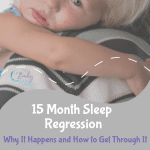
The 9-month sleep regression is a 3 to 6-week period of time when your baby might wake up a lot at night and take short naps. In other words, your 9 month old stops sleeping! Can you avoid the 9-month sleep regression? Based on my 15 years as a sleep consultant, there are 7 things you can do to try to avoid it altogether that I’m going to share with you today!
What is the 9 Month Sleep Regression?
As with most sleep regressions, the 9-month sleep regression causes a baby to wake up a lot at night and take short naps. This sleep regression is usually tied to a period of development when a baby is learning to crawl or cruise around furniture, teething, and experiencing a peak of separation anxiety.
Sleep Regression Signs
9-month sleep regression signs include frequent night-waking, short naps, fussiness, irritability, and separation anxiety much like many of the others.
How Long Does the 9 Month Sleep Regression Last?
This particular sleep regression typically lasts around 3 to 6 weeks with some days and nights being better than others.
7 Tips to Avoid the 9 Month Sleep Regression:
While we can’t avoid the 9-month sleep regression all of the time, in my experience as a sleep consultant for over 15 years, I have seen the families who are most likely to avoid it. Here are my tips based on my work with thousands of babies:
Transition to Two Naps
One of the 9 month sleep regression signs is frequent waking at night. One thing that people don’t realize is that sometimes frequent night waking is caused by too much daytime sleep and/or too many naps during the day. If you are still offering your 9 month old three naps, it could be time to drop a nap. If you’re worried about it because your baby is taking three 30-minute short naps, don’t be. Sometimes, we don’t see naps get longer until we transition to two naps!
You May Also Be Interested In…
Adjust Milk and Solid Food For Your 9-Month-Old
Babies have several growth spurts during their first year. Consider whether your 9-month old is going through a growth spurt AND becoming more mobile. A lot of physical activity can make all of us a lot hungrier! Babies this age need 25-35 oz of breast milk, 20-30 oz of formula, or a combination of milk each day, on average. In addition, they typically eat 2-3 solid meals per day, too. Consider whether you need to make milk and/or solid feedings bigger!
On the other hand, there are some parents who are over-feeding solid food which causes a baby to drink less milk during the day. When that happens, they start waking at night to drink the milk they’re missing. It is important to have the right balance of milk and solid food since some solid food is not very high in fat or calories (i.e. broccoli is good for you but low-calorie!)
You May Also Be Interested In…
Stop Using Sleep Associations
When you have a newborn, you often feed or rock your baby to sleep. But, eventually, your baby gets bigger and it becomes harder to put them down already asleep. This can often happen around 9 months old and your baby is more mobile. Oftentimes, your baby might stand up in their crib right away which is what makes it even more challenging at this age.
If you are putting your baby all the way to sleep, we call that a sleep association. We all have them so that’s not the problem. I love to sleep with a blanket and pillow, my sleep associations. But, when it involves YOU, your baby will have more trouble sleeping when you’re not around. So, ideally, you would put hour baby down awake and let them fall asleep in their crib or bed on their own.
You May Also Be Interested In…
Sleep Training or Gentle Sleep Coaching
Putting your baby down awake sounds simple enough but if it was, I wouldn’t even be here! My son struggled with this concept so much that he inspired an entire website and business for the last decade-plus!
When your baby can’t be put down awake, we sometimes need to do something called sleep training or sleep coaching. There are many sleep training methods and the one you choose will depend on your baby’s temperament and personality along with your parenting style. For example, if you are practicing attachment parenting, you will probably want to use a gentler approach. For others, their baby may not improve their sleep with a gentler approach and they may opt for something like the Ferber Method. Choose the method that you are most likely to commit and success will follow! And, if you’re not sure which method is the right fit, consider utilizing sleep training services.
You May Also Be Interested In…
Encourage Independence and Separation
During the 9-month-old sleep regression, some babies may experience separation anxiety. It is normal for babies to have peaks and valleys for separation anxiety. In general, if you never leave your baby’s side, this could reinforce this feeling. It is typically recommended to practice small periods of time for separation. You can start with playing peek-a-boo, for example, and work your way up to going into another room for 2-3 minutes at a time (assuming it’s safe to leave your baby unattended, of course!) Encourage your baby to be a little independent and to learn that whenever you leave, you come back!
Work on Gross Motor Development and Skills
A big reason for the 9-month sleep regression is due to developmental milestones at 9 months. Your baby could be putting sounds together starting to make “words,” smiling, laughing, and looking for objects that are out of sight. But, the bigger milestones we see impact sleep are related to crawling, standing, and cruising. If your baby is working on gross motor development, you might find them “practicing” in their crib and sometimes when they don’t even want to! This can impact sleep in a negative way. So, during the day, be sure to give them ample time to practice these big milestones.
Re-Evaluate Your Baby’s Wake Windows
The last thing to consider in order to avoid or fix the 9 month sleep regression is that your baby’s wake windows could be too short or too long. Most babies this age stay awake 2 to 2 1/2 hours first thing in the morning, 2 1/2 to 3 hours before their second nap, and 3-4 hours before bedtime. Keep in mind that not ALL babies this age can stay awake 4 hours before bedtime. You could be better off increasing the other wake windows and shortening the one before bedtime to 3 to 3 1/2 hours, for example. If your baby is overtired, they are more likely to wake up frequently at night.
I hope this article helped you learn a bit more about this sleep regression and your baby. If not, we are here to help! See below to learn how.








